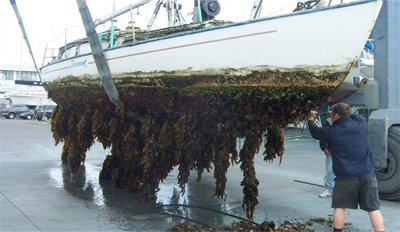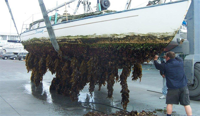PRINCESS ANNE, Md.-- The U.S. Navy awarded a $1 million grant to a researcher at the University of Maryland Eastern Shore to tackle one of their most costly problems--–biofilm formation, or what's known as 'fouling.'
The 'U.S. Navy Minority Serving Institution Grant' was given to Dr. Victoria Volkis, a professor of chemistry and the director of UMES’ Master of Science program, and students from underrepresented minorities in STEM, to find a solution to the biofilm formation that's often seen at the bottom of ships.
Biofilm essentially is when microorganisms like bacteria, attach to a surface in a moist environment and begin to reproduce a sticky-like substance.
"The damage is more than just the boat, and if you think about the cost of this damage, it's not just the cost of scrapping down and clean[ing] and repair[ing] the boat but also the more this boat will agglomerate, the more its coal will coercively damage it, and the more fuel this boat or ship will consume," Dr. Volkis explained.
According to Dr. Volkis, these damages are roughly millions of dollars a year-- not including permanent damages. She said biofilm also poses an environmental threat as it could kill many sea animals (such as fish, crabs and oysters), and in turn, be toxic to those who unknowingly consume it.
Biofilm formations seem to be everywhere--in space shuttles, in homes present in water pipes, and sometimes even in your mouth. The excessive buildup of it can become damaging to humans, animals, and objects. That is why the focus of UMES’ study is to create an environmentally-friendly solution and examine essential oils, terpenes and antioxidants from berries, leaves of specialty crops, medical herbs and algae (phytoextracts) for their antifouling properties.
"I love that because the bacteria that actually, that Dr. Volkis is looking at, some of them produce some toxins that are good for heart disease, good for cancer cells and that's how I got into it," said PhD Toxicology Grad Student at UMES, Riham Alhag.
Natural Sciences Department Chair Dr Jonathan Cumming said having diverse undergraduate and graduate students (and from chemistry, biology and toxicology backgrounds) involved in the project is essential.
"Extensive research and understanding (shows) that more diverse organizations are way more effective at finding answers to complex questions and problems," he said.
Dr. Volkis will devote all of her academic time to the project as the recipient of a Distinguished Faculty Fellow award for the next three years.






